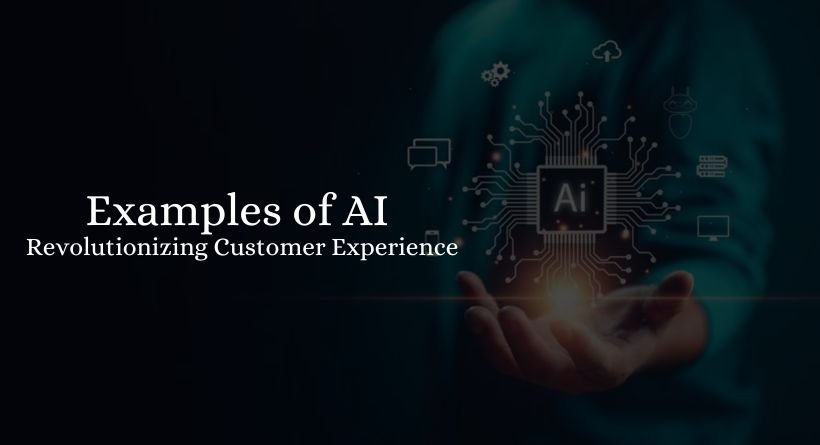In today’s fast-paced, competitive business environment, delivering a personalized and responsive customer experience has become a crucial challenge for companies.
The question you might be asking is: how can you anticipate customer needs, enhance engagement, and streamline service delivery? If you’re grappling with these concerns, you’re not alone.
Many businesses are facing similar hurdles in today’s digital-first landscape. Fortunately, there’s a powerful solution that’s reshaping how companies interact with customers: Artificial Intelligence (AI).
In this article, we will dive deep into the world of Artificial Intelligence and explore how it can revolutionize your approach to customer experience.
From personalization to automation, AI can help you keep your customers at the heart of your business while giving you a significant edge over your competitors. Ready to embark on this journey? Let’s begin!
What is Artificial Intelligence?
Definition and the Rise of AI
Artificial Intelligence (AI) refers to the simulation of human intelligence in machines designed to think, learn, and solve problems autonomously.
AI is built upon various technologies, including machine learning (ML), natural language processing (NLP), and deep learning, enabling systems to recognize patterns, make predictions, and improve over time.
AI has seen exponential growth in the last decade, driven by the availability of vast amounts of data, increased computing power, and advancements in algorithms.
This growth has made AI an indispensable tool in almost every industry, especially in enhancing customer experience.
The Role of AI in Modern Business
In the business landscape, AI is much more than a trend; it is transforming how companies operate and interact with their customers.
Its applications range from improving decision-making to increasing operational efficiency. However, its most significant impact is arguably on customer experience.
AI has the ability to deliver a personalized, efficient, and proactive service that can dramatically enhance customer satisfaction and loyalty.
How AI is Transforming Customer Experience
Let’s take a closer look at how AI is changing the way businesses interact with their customers, creating experiences that are more personalized, efficient, and proactive.
The Impact of AI on Customer Experience
Personalization with AI: A New Frontier
One of AI’s most powerful capabilities is its ability to personalize customer experiences in real-time.
By analyzing customer behavior and preferences, AI can tailor products, services, and interactions to meet individual needs.
For example, Netflix uses AI-driven algorithms to analyze user viewing habits and recommend content that aligns with individual preferences.
This type of hyper-personalization enhances customer engagement, satisfaction, and loyalty.
Table 1: Examples of Personalization through AI
| Industry | AI Application | Benefits |
|---|---|---|
| E-commerce | Personalized product recommendations | Increased sales and customer satisfaction |
| Media | Content recommendations (e.g., Netflix) | Enhanced user engagement and retention |
| Retail | Tailored marketing campaigns | Higher conversion rates and customer loyalty |
| Travel | Personalized travel suggestions | Improved customer experiences and satisfaction |
Efficiency and Speed: AI-Powered Customer Service
AI is also transforming customer service by automating routine tasks and providing instant responses.
AI-powered chatbots and virtual assistants can handle basic customer inquiries, such as answering frequently asked questions, tracking orders, and troubleshooting simple issues.
This not only reduces wait times but also allows human customer service agents to focus on more complex problems, leading to a more efficient service overall.
Table 2: Benefits of AI-Powered Customer Service
| AI Application | Benefits for Businesses | Benefits for Customers |
|---|---|---|
| AI Chatbots (e.g., in e-commerce) | Reduced operational costs | 24/7 support, instant responses |
| Virtual Assistants (e.g., banking) | Streamlined customer interactions | Easy access to account information and services |
| Automated Email Responses | Faster query resolution | Consistent, timely communications |
Proactive Service: Anticipating Customer Needs with AI
AI’s predictive capabilities allow businesses to anticipate customer needs before they even arise.
By analyzing past behavior and patterns, AI can predict what customers are likely to want or need in the future, allowing businesses to provide proactive solutions.
For example, a fitness app may suggest workouts based on the user’s past activity or preferences. Similarly, AI can predict when a product might need maintenance or replacement and alert customers before any issues arise.
Case Study: AI in Telecoms
In telecommunications, AI can predict network problems before they affect customers.
This proactive approach ensures a smooth service experience by resolving potential issues before they escalate into complaints.
Also Read: Outsource Call Center: The Future of Efficient Business Communication
AI in Action: Real-Life Case Studies

Case Study 1: AI in E-commerce
E-commerce giants like Amazon use AI to provide personalized shopping experiences.
AI analyzes browsing history, purchase patterns, and product preferences to recommend items customers are more likely to buy.
This boosts sales and creates a more seamless shopping experience.
Case Study 2: AI in Banking
The banking industry is also leveraging AI to enhance customer service.
AI-powered chatbots like Erica from Bank of America assist customers with tasks such as checking account balances, transferring funds, and even managing investments.
These AI tools provide 24/7 service while reducing the need for human intervention.
Case Study 3: AI in Telecommunications
Telecom companies are using AI to improve customer experience by predicting potential network failures before they happen.
By analyzing network data, AI can forecast outages and enable preemptive measures, ensuring customers have consistent, reliable service.
Implementing AI in Your Business for Enhanced Customer Experience
Steps to Integrate AI in Your Business
To successfully implement AI and enhance customer experience, businesses should follow a clear roadmap:
- Identify Key Areas: Start by identifying where AI can add the most value, such as customer service, marketing, or product recommendations.
- Collect and Clean Data: AI needs large volumes of accurate data to function effectively. Ensure that your data is organized, clean, and ready for analysis.
- Develop AI Models: Choose or develop AI models that align with your business objectives. Whether it’s machine learning, natural language processing, or deep learning, pick the right tool for the job.
- Monitor and Adjust: AI is not a one-time fix. Continuously monitor performance and make adjustments as needed to optimize results.
Key Considerations for Successful AI Implementation
While AI offers many benefits, it’s essential to consider the following for a successful implementation:
- Data Privacy: Ensure that customer data is protected and that AI solutions comply with relevant regulations, such as GDPR.
- Ethical Considerations: AI should complement, not replace, human intelligence. Avoid relying on AI to the extent that it undermines human oversight and ethical decision-making.
- Continuous Monitoring: AI models require continuous monitoring and updates to ensure they are functioning as intended and delivering the desired results.
Future of AI in Customer Experience
Upcoming Trends in AI for Business
AI’s potential continues to grow, with several exciting trends on the horizon. These include:
- Voice-Activated AI: Voice-based interactions, like those seen with Amazon’s Alexa and Google Assistant, are expected to become even more prevalent, offering hands-free, personalized customer service.
- Emotion Recognition: AI is beginning to detect and analyze human emotions through facial expressions, voice tone, and behavior. This will allow for even more personalized customer interactions.
- AI in Virtual Reality (VR): As VR technology advances, AI will play a critical role in creating immersive, customer-centric experiences, particularly in retail and entertainment.
Opportunities and Challenges Ahead
AI presents immense opportunities for businesses to enhance customer experience, from personalization to predictive service.
However, challenges such as data privacy concerns, the cost of implementation, and the need for regulatory frameworks must be addressed.
Businesses that embrace AI while balancing these challenges stand to gain a significant competitive edge.
Conclusion: The AI-Driven Future of Customer Experience
As we’ve explored, the transformative potential of Artificial Intelligence in the business world is immense.
From personalization to efficiency and proactive service, AI is reshaping how businesses interact with their customers.
With case studies from industries like e-commerce, banking, and telecommunications, it’s clear that AI’s impact is already widespread.
However, successful AI integration requires careful planning, ethical considerations, and ongoing management.
The future of customer experience is AI-driven, and as technology continues to advance, businesses must adapt to stay ahead of the competition. Don’t wait—start exploring the possibilities AI offers for your business today.
FAQs
Q: What is Artificial Intelligence (AI)?
A: Artificial Intelligence (AI) is the science of training machines to mimic human intelligence. It’s designed to learn and solve problems, similar to a human brain.
Q: How is Artificial Intelligence used in business?
A: In business, AI can be used to enhance customer experience, streamline operations, and inform decision-making. It can personalize user experiences, improve customer service efficiency, and proactively address customer needs.
Q: Can AI be integrated into any business?
A: Yes, with strategic planning and a clear understanding of the value AI can bring, any business can integrate AI to enhance its operations and customer experience.
Q: What are the challenges of integrating AI into my business?
A: Challenges of integrating AI include data security, ethical concerns, and the need for regulatory frameworks. It’s essential to plan for these issues to ensure successful AI implementation.
Q: What is the future of AI in customer experience?
A: The future of AI in customer experience looks promising with trends like voice-based AI, emotion recognition, and AI-powered virtual reality on the horizon. These developments will continue to redefine customer experience in various sectors.


